Unit 4 Stories and Poems lessons 23-24 课件(共30张PPT)
文档属性
| 名称 | Unit 4 Stories and Poems lessons 23-24 课件(共30张PPT) |

|
|
| 格式 | zip | ||
| 文件大小 | 4.7MB | ||
| 资源类型 | 教案 | ||
| 版本资源 | 冀教版 | ||
| 科目 | 英语 | ||
| 更新时间 | 2022-08-16 00:00:00 | ||
图片预览

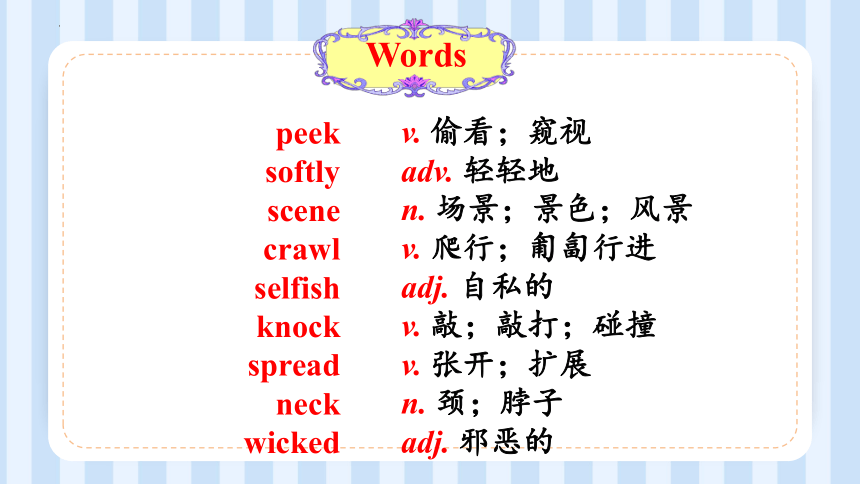





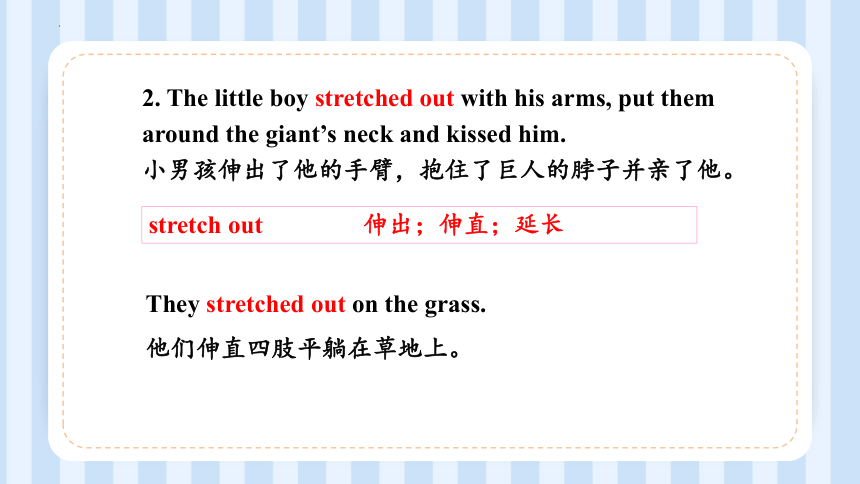
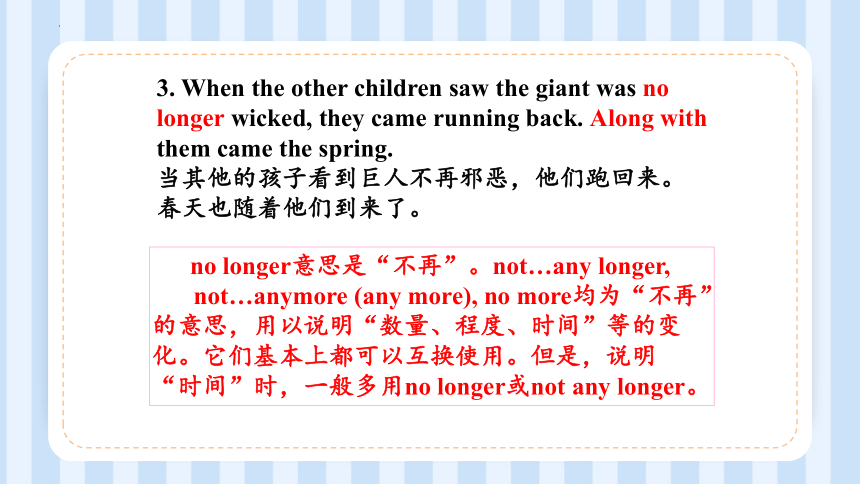
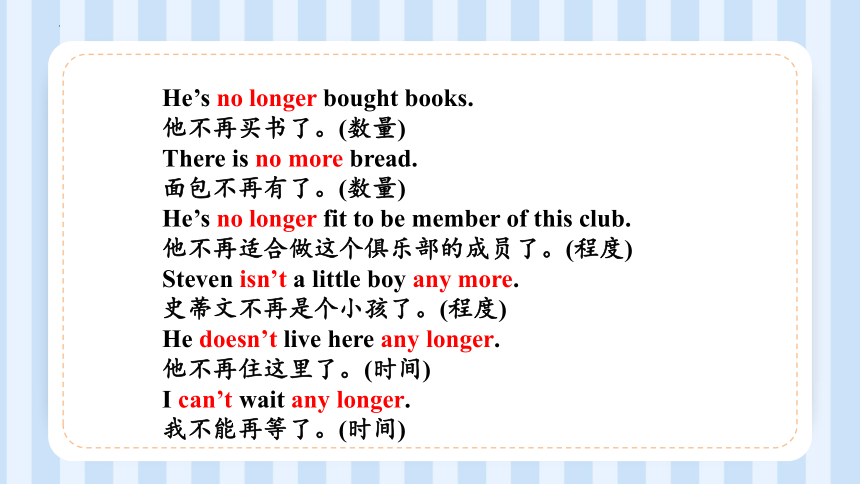

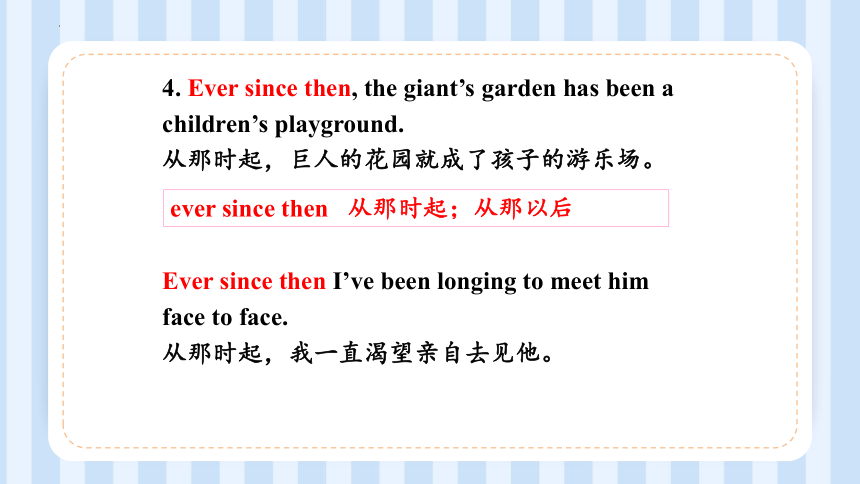
文档简介
(共30张PPT)
冀教版·九年级全册
Lesson 23
Unit 4 Stories and Poems
Words
peek
softly
scene
crawl
selfish
knock
spread
neck
wicked
v. 偷看;窥视
adv. 轻轻地
n. 场景;景色;风景
v. 爬行;匍匐行进
adj. 自私的
v. 敲;敲打;碰撞
v. 张开;扩展
n. 颈;脖子
adj. 邪恶的
By looking at the pictures in the student book, what do you think is going to happen in the story What did the giant see when he jumped out of bed What happened to the garden in the end
1. To continue studying the fairy tale the Giant
2. To summarize the moral of the fairy tale
3. To learn some useful words and
expressions
Objectives
Words:
knock spread neck peek selfish
Phrases:
knock down at once ever since
break out in blossom stretch out
along with no longer
Patterns:
Along with them came the spring.
1
Read the lesson and write true (T) of false (F).
1. The giant saw something wonderful after he jumped out of his bed. ( )
2. The children entered the garden by way of the gate.
( )
3. The giant let only one little boy play in his garden.
( )
4. Along with the children came the spring. ( )
1. I will knock down the wall!
我一定要把墙拆毁!
knock down 击倒;撞倒;拆毁;否定(建议等)
I carelessly knocked the chair down.
我不小心将椅子撞倒了。
It’s a pity that the old house was knocked down.
很可惜,那幢老房子被拆毁了。
2. The little boy stretched out with his arms, put them around the giant’s neck and kissed him.
小男孩伸出了他的手臂,抱住了巨人的脖子并亲了他。
stretch out 伸出;伸直;延长
They stretched out on the grass.
他们伸直四肢平躺在草地上。
3. When the other children saw the giant was no longer wicked, they came running back. Along with them came the spring.
当其他的孩子看到巨人不再邪恶,他们跑回来。春天也随着他们到来了。
no longer意思是“不再”。not…any longer,
not…anymore (any more), no more均为“不再”的意思,用以说明“数量、程度、时间”等的变化。它们基本上都可以互换使用。但是,说明“时间”时,一般多用no longer或not any longer。
He’s no longer bought books.
他不再买书了。(数量)
There is no more bread.
面包不再有了。(数量)
He’s no longer fit to be member of this club.
他不再适合做这个俱乐部的成员了。(程度)
Steven isn’t a little boy any more.
史蒂文不再是个小孩了。(程度)
He doesn’t live here any longer.
他不再住这里了。(时间)
I can’t wait any longer.
我不能再等了。(时间)
along with 和……一起;随着
I like to bring my pet along with me.
我喜欢带着我的宠物。
Can you go along with me
你能与我同行吗
I’ll go along with you on this one.
在这一点上我同意你的看法。
4. Ever since then, the giant’s garden has been a children’s playground.
从那时起,巨人的花园就成了孩子的游乐场。
ever since then 从那时起;从那以后
Ever since then I’ve been longing to meet him face to face.
从那时起,我一直渴望亲自去见他。
Time for reflection
knock down
stretch out
no longer
along with
ever since then
击倒;撞倒;拆毁
伸出;伸直;延长
不再
和……一起;随着
从那时起;从那以后
Ⅰ.根据括号内的汉语完成句子。
1. _______ (敲门) before you enter.
2. The disease was _______ (传播) in the small town.
3. He described the ______(场景,情景) to me.
4. Judging by his actions, he is rather ______ (自私的).
5. She looked at me as if I were the ________ (邪恶的)stepmother.
Knock
spread
scene
selfish
wicked
Exercises
Ⅱ. Translate the following sentences.
1. 他被车撞倒后死在了医院。
He died in hospital after being knocked down by a car.
2. 她要他马上离开房间。
She told him to leave the room at once.
3. 他不再是个小孩了。
He is no longer a child.
4. 自从你离开后他就一直在那里!
He’s been there ever since you left!
5. 迈克和他的女朋友一起去了公园。
Mike went along with his girlfriend to the park.
6. 我的苹果树终于迎来了开花期。
My apple tree has finally broken out in blossom.
Lesson 24
Words
fairy
tale
character
plot
humorous
n. 仙子;小精灵
n. 故事;童话
n. (小说、戏剧当中的)人物;特点;特色
n. 情节
adj. 幽默的;诙谐的
What’s the difference between poem and story
VS
poem
format
rhyme
short length
meaning
syllable
story
characters
plot
setting
conflict
resolution
long length
Which do you prefer to write, poems or stories
1. To listen and understand the passage
2. To learn to write a humorous poem
3. To learn some useful words and
expressions
Objectives
Words:
humorous fairy tale character plot
Phrases:
fairy tale at the beginning
Patterns:
I like reading stories, but they are very hard to write.
1
Read the lesson and write true (T) or false (F).
1. Danny learned how to write songs last
week. ( )
2. Danny likes reading stories. ( )
3. Danny thinks stories are easier to
write. ( )
1. At the beginning, I was afraid to try writing a poem. 起初,我不敢尝试写诗歌。
at the beginning “ 开始时;起初”,at也可以换成in。
They were cheerful in/ at the beginning.
开始时,他们情绪高涨。
后接of短语时,只能用at the beginning.
A policeman stood at the beginning of the street.
一位警察站在街道的起点处。
2. Then my teacher encouraged me to write a humorous poem because I am always saying funny things.
后来,老师鼓励我写幽默的诗,因为我总是说一些有趣的事情。
always副词,表示“总是,一直”,常用于一般现在时,表示经常性的行为和动作。always也可以用于进行时,表示某种思想、情绪或行为反复发生,且含有不满、厌恶、烦躁、感叹等感彩。
You are always making troubles!
你怎么老找麻烦!
Team racing
Activity
Two teams have a race. The team first giving the correct rhyming words gets one point.
knock: ____________________________
lie: _______________________________
loud: _____________________________
sun:_______________________________
sing:______________________________
game:_____________________________
fat:_______________________________
dress: _____________________________
well: ______________________________
true: ______________________________
sock, clock, lock
shy, pie, why
proud, crowd, aloud
fun, son, done
thing, bring, ring
shame, name, blame
bat, cat, hat
press, bless, guess
hell, bell, spell
do, zoo, blue
Write another three words that rhyme with the following words.
THANK YOU
冀教版·九年级全册
Lesson 23
Unit 4 Stories and Poems
Words
peek
softly
scene
crawl
selfish
knock
spread
neck
wicked
v. 偷看;窥视
adv. 轻轻地
n. 场景;景色;风景
v. 爬行;匍匐行进
adj. 自私的
v. 敲;敲打;碰撞
v. 张开;扩展
n. 颈;脖子
adj. 邪恶的
By looking at the pictures in the student book, what do you think is going to happen in the story What did the giant see when he jumped out of bed What happened to the garden in the end
1. To continue studying the fairy tale the Giant
2. To summarize the moral of the fairy tale
3. To learn some useful words and
expressions
Objectives
Words:
knock spread neck peek selfish
Phrases:
knock down at once ever since
break out in blossom stretch out
along with no longer
Patterns:
Along with them came the spring.
1
Read the lesson and write true (T) of false (F).
1. The giant saw something wonderful after he jumped out of his bed. ( )
2. The children entered the garden by way of the gate.
( )
3. The giant let only one little boy play in his garden.
( )
4. Along with the children came the spring. ( )
1. I will knock down the wall!
我一定要把墙拆毁!
knock down 击倒;撞倒;拆毁;否定(建议等)
I carelessly knocked the chair down.
我不小心将椅子撞倒了。
It’s a pity that the old house was knocked down.
很可惜,那幢老房子被拆毁了。
2. The little boy stretched out with his arms, put them around the giant’s neck and kissed him.
小男孩伸出了他的手臂,抱住了巨人的脖子并亲了他。
stretch out 伸出;伸直;延长
They stretched out on the grass.
他们伸直四肢平躺在草地上。
3. When the other children saw the giant was no longer wicked, they came running back. Along with them came the spring.
当其他的孩子看到巨人不再邪恶,他们跑回来。春天也随着他们到来了。
no longer意思是“不再”。not…any longer,
not…anymore (any more), no more均为“不再”的意思,用以说明“数量、程度、时间”等的变化。它们基本上都可以互换使用。但是,说明“时间”时,一般多用no longer或not any longer。
He’s no longer bought books.
他不再买书了。(数量)
There is no more bread.
面包不再有了。(数量)
He’s no longer fit to be member of this club.
他不再适合做这个俱乐部的成员了。(程度)
Steven isn’t a little boy any more.
史蒂文不再是个小孩了。(程度)
He doesn’t live here any longer.
他不再住这里了。(时间)
I can’t wait any longer.
我不能再等了。(时间)
along with 和……一起;随着
I like to bring my pet along with me.
我喜欢带着我的宠物。
Can you go along with me
你能与我同行吗
I’ll go along with you on this one.
在这一点上我同意你的看法。
4. Ever since then, the giant’s garden has been a children’s playground.
从那时起,巨人的花园就成了孩子的游乐场。
ever since then 从那时起;从那以后
Ever since then I’ve been longing to meet him face to face.
从那时起,我一直渴望亲自去见他。
Time for reflection
knock down
stretch out
no longer
along with
ever since then
击倒;撞倒;拆毁
伸出;伸直;延长
不再
和……一起;随着
从那时起;从那以后
Ⅰ.根据括号内的汉语完成句子。
1. _______ (敲门) before you enter.
2. The disease was _______ (传播) in the small town.
3. He described the ______(场景,情景) to me.
4. Judging by his actions, he is rather ______ (自私的).
5. She looked at me as if I were the ________ (邪恶的)stepmother.
Knock
spread
scene
selfish
wicked
Exercises
Ⅱ. Translate the following sentences.
1. 他被车撞倒后死在了医院。
He died in hospital after being knocked down by a car.
2. 她要他马上离开房间。
She told him to leave the room at once.
3. 他不再是个小孩了。
He is no longer a child.
4. 自从你离开后他就一直在那里!
He’s been there ever since you left!
5. 迈克和他的女朋友一起去了公园。
Mike went along with his girlfriend to the park.
6. 我的苹果树终于迎来了开花期。
My apple tree has finally broken out in blossom.
Lesson 24
Words
fairy
tale
character
plot
humorous
n. 仙子;小精灵
n. 故事;童话
n. (小说、戏剧当中的)人物;特点;特色
n. 情节
adj. 幽默的;诙谐的
What’s the difference between poem and story
VS
poem
format
rhyme
short length
meaning
syllable
story
characters
plot
setting
conflict
resolution
long length
Which do you prefer to write, poems or stories
1. To listen and understand the passage
2. To learn to write a humorous poem
3. To learn some useful words and
expressions
Objectives
Words:
humorous fairy tale character plot
Phrases:
fairy tale at the beginning
Patterns:
I like reading stories, but they are very hard to write.
1
Read the lesson and write true (T) or false (F).
1. Danny learned how to write songs last
week. ( )
2. Danny likes reading stories. ( )
3. Danny thinks stories are easier to
write. ( )
1. At the beginning, I was afraid to try writing a poem. 起初,我不敢尝试写诗歌。
at the beginning “ 开始时;起初”,at也可以换成in。
They were cheerful in/ at the beginning.
开始时,他们情绪高涨。
后接of短语时,只能用at the beginning.
A policeman stood at the beginning of the street.
一位警察站在街道的起点处。
2. Then my teacher encouraged me to write a humorous poem because I am always saying funny things.
后来,老师鼓励我写幽默的诗,因为我总是说一些有趣的事情。
always副词,表示“总是,一直”,常用于一般现在时,表示经常性的行为和动作。always也可以用于进行时,表示某种思想、情绪或行为反复发生,且含有不满、厌恶、烦躁、感叹等感彩。
You are always making troubles!
你怎么老找麻烦!
Team racing
Activity
Two teams have a race. The team first giving the correct rhyming words gets one point.
knock: ____________________________
lie: _______________________________
loud: _____________________________
sun:_______________________________
sing:______________________________
game:_____________________________
fat:_______________________________
dress: _____________________________
well: ______________________________
true: ______________________________
sock, clock, lock
shy, pie, why
proud, crowd, aloud
fun, son, done
thing, bring, ring
shame, name, blame
bat, cat, hat
press, bless, guess
hell, bell, spell
do, zoo, blue
Write another three words that rhyme with the following words.
THANK YOU
同课章节目录
- Unit 1 Stay Healthy
- Lesson 1 What's Wrong,Danny?
- Lesson 2 A Visit to the Dentist
- Lesson 3 Good Food, Good Health
- Lesson 4 Don't Smoke, Please!
- Lesson 5 Jane's Lucky Life
- Lesson 6 Stay Away from the Hospital
- Unit Review
- Unit 2 Great People
- Lesson 7 What Is the Meaning of Lift?
- Lesson 8 A Universe of Thought
- Lesson 9 China's Most Famous "Farmer"
- Lesson 10 Touch the World
- Lesson 11 To China, with Love
- Lesson 12 Guess My Hero!
- Unit Review
- Unit 3 Safety
- Lesson 13 Be Careful,Danny!
- Lesson 14 Accidents Happen
- Lesson 15 My Helmet Saved My Life!
- Lesson 16 How Safe Is Your Home?
- Lesson 17 Staying Safe in an Earthquake
- Lesson 18 Never Catch a Dinosaur
- Unit Review
- Unit 4 Stories and poems
- Lesson 19 A Story or a Poem?
- Lesson 20 Say It in Five
- Lesson 21 The Fable of the Woodcutte
- Lesson 22 The Giant(Ⅰ)
- Lesson 23 The Giant(Ⅱ)
- Lesson 24 Writing a Poem
- Unit Review
- Unit 5 Look into Science
- Lesson 25 Let's Do an Experiment!
- Lesson 26 Keep the Candle Burning
- Lesson 27 Planet Danny
- Lesson 28 The Study of Living Things
- Lesson 29 DNA—The Story of You
- Lesson 30 Science Affects Us
- Unit Review
- Unit 6 Movies and Theate
- Lesson 31 A movie or a Play
- Lesson 32 Moving Pictures
- Lesson 33 The Fisherman and the Goldfish(Ⅰ)
- Lesson 34 The Fisherman and the Goldfish(Ⅱ)
- Lesson 35 Theatres Are Fun!
- Lesson 36 Making Plays Is Fun
- Unit Review
